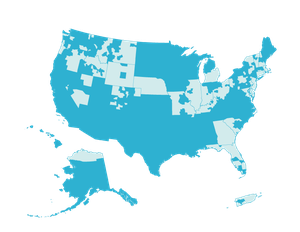When the Great Recession threatened to quash a rural self-help community in the making, LISC helped a partner defy the odds. Today, 56 families have homes of their own in Biggs, CA—population 1,700 and growing.
Natali Gonzalez, a native of California’s sunbaked, rural Sacramento Valley, was never one to waste time daydreaming about owning a home. She had plenty of real-life concerns to occupy her time—and her paycheck. Like raising four children with her husband, a truck driver, squeezed into a two-bedroom rental, and working as a preschool teacher in her hometown of Colusa, a small, agricultural community.
Still, Gonzalez was always on the lookout for better, more stable housing for her family, and one day noticed a group of homes going up on a nearby block. That’s how she learned about Community Housing Improvement Program (CHIP), a Rural LISC partner, and its self-help housing initiative, whereby low-income families build their own homes through a federal program that funds local organizations who purchase land and oversee financing and construction.
The Colusa lots were already spoken for. But in 2008, CHIP had embarked on a 17-acre, self-help development that would comprise 56 single-family lots in the small town of Biggs, CA, about 30 miles away. With support from LISC, CHIP had bought the land and readied it for development.
The project, called North Biggs Estates, was slated to begin with nine eligible families who would dedicate 30 hours of labor a week to erecting homes on the lots. Their “sweat equity” would serve as a down payment. Neighbors would help neighbors. No experience necessary. Gonzalez and her family, no strangers to hard work, jumped on board. “Homeownership was never a reality I thought could exist,” she says. “Especially not where I would get to build my own home.”

But that reality nearly didn’t come to be: shortly after Gonzalez and her family were approved for the program, the Great Recession hit the Sacramento Valley—already suffering economic decline—like a ton of cinder blocks. Property values plummeted, and banks retreated. The local bank servicing CHIP’s loans to build North Biggs Estates threatened foreclosure, and the promise of new homes, along with the hopes of the self-help families, crumpled.
“The world changed so quickly, we feared that our clients and their families might never become homeowners,” says Dave Ferrier, CHIP’s president and CEO. Biggs, a town of just 1,700, surrounded by rice lands and walnut orchards an hour north of Sacramento, had long struggled to meet the affordable housing needs of residents. As in so many rural settlements in California, jobs and commerce have dwindled, two-thirds of residents cannot afford their rent and the after-effects of the recession have kept many tethered in poverty. A prominent feature of the website for the City of Biggs is a link to KeepYourHomeCalifornia.org, a foreclosure prevention service.
Still, Ferrier knew he had a resource to draw on: he called LISC. Rural LISC helped CHIP negotiate a discounted buyout of the bank loan, and by 2010, plans for North Biggs Estates were back in order. “Once the pieces were in place, we simply had to do what we do best: put one foot in front another, get the families’ financing closed and start construction,” says Ferrier.
And construct they did. Beginning in 2014, after years of preparation, the North Biggs families came together on weekends and in the evenings after work to help each other frame out walls, mud sheetrock and staple flashing.

It was slow, demanding work, but it paid off. As of early this year, 34 families had moved into their new homes in Biggs, and another 22 homes will soon be completed. “Building the houses was not as hard as you would think it is,” Gonzalez recalls. “You give it your heart, love and soul because you look forward to the new memories you will be making with your family.”
For CHIP’s self-help residents, homeownership provides security and a new kind of independence. Ana Delgado, a single mother who lives with her children in another CHIP development in the town of Orland, describes sleepless nights spent fretting over her rising rent and how to make ends meet. “Now that I have a home for my kids,” she says, “I don’t have to worry about rent going up.”

For Suzanne Anarde, head of Rural LISC, who served as the loan officer during the North Biggs crisis, the trust between partners is what saved the project that nearly wasn’t. “Rural community development is all about relationships,” she says. “We have a strong connection with CHIP, which was made even stronger by the ‘perfect storm’ we weathered during 2008.”
Thanks to the strength of that relationship, 56 families can count on the returns on their sweat equity. “It was so much fun getting to know my neighbors and developing friendships with them as we helped each other,” says Gonzalez. “Now my kids play with their kids in homes that we built together.”


